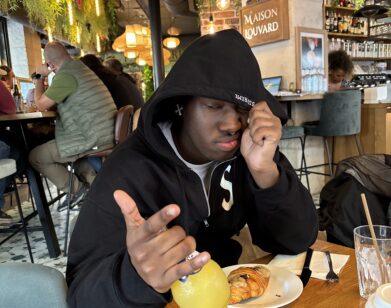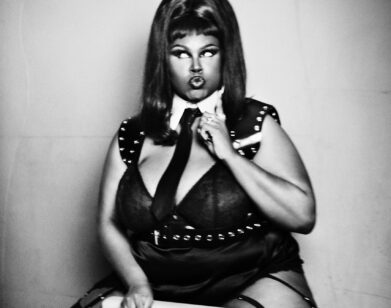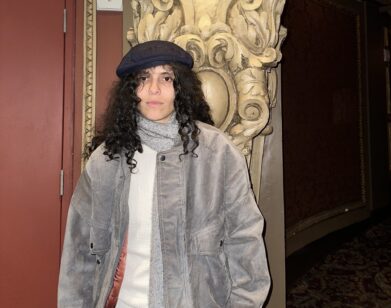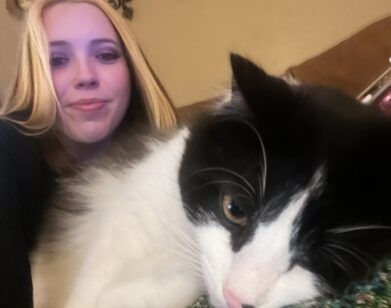Deep DIIV
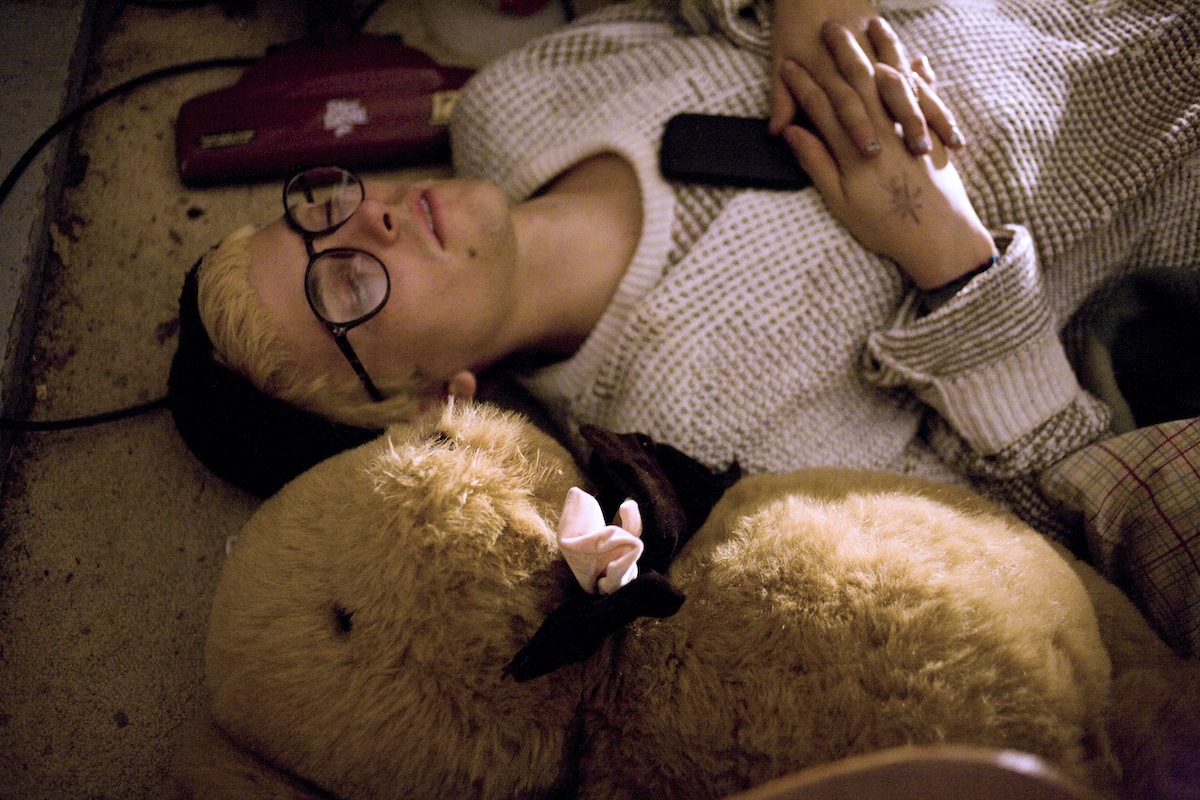
IMAGE COURTESY OF SANDY KIM
The final shot of Brooklyn band DIIV’s new video “How Long Have You Known?” features singer and songwriter Z. Cole Smith popping a purple capsule in his mouth. Smith has spent the previous three and a half minutes in mad scientist garb, tossing all manner of found objets—including toaster coils, Nirvana tapes, a star from an American flag, and an almond from an Almond Joy—into a blender, only to ignite it with a roman candle. The pill is what comes out. We’ll have what he’s having.
A pharmaceutical visual is not a bad place to start with DIIV, whose swirling, chiming music melds the Motorik and the psychedelic, with just a touch of early grunge thrown in for good measure—Smith’s passions range from shamanism to Kurt Cobain. Even without chemical assistance, songs like “Human,” “Doused,” and “Wait” from the band’s debut album Oshin, due this month, are plenty transcendental.
A onetime Connecticut prep school expellee, Smith distinguished himself on the Brooklyn scene several years back playing with bands like Soft Black and Beach Fossils (with whom he still tours). But in a weeks-long flurry of creativity in a Bushwick loft one year ago, Smith conceived of DIIV and wrote the majority of its songs. In a matter of months, he and his new bandmates—longtime friend Andrew Bailey, skateboarder-turned-guitarist and full-time astrologer Devin Ruben Perez, and West Coaster Colby Hewitt—were one of Brooklyn’s hardest-working and most-discussed new bands, playing several times a week, sometimes twice in a night. It’s all led to one of the more anticipated debuts of the year. We talked about it and more with the gents of DIIV at the Greenpoint offices of their much-beloved label, Captured Tracks.
JOHN NORRIS: Guys, this is a band that only a year ago had just barely begun, right? And at the time you just had a handful of songs?
Z. COLE SMITH: The band formed about one year ago. I think our first show was literally a year ago. June 20, July 29, something like that?
DEVIN RUBEN PEREZ: It was the end of July.
SMITH: End of July. It’s funny, when I was first writing songs for this record, all the song titles would be just like the date, and then a short word describing it. And I could probably look back and see that I recorded some song on the record like today, exactly one year ago. Basically I wrote all the songs, with a few exceptions, in May of last year.
NORRIS: In a very concentrated amount of time?
SMITH: Yeah, yeah, real concentrated. A couple of the songs that don’t sound anything like each other, I wrote on the same day, within like 10 minutes of each other.
NORRIS: For almost a year now, you guys have played a ton of shows. Especially locally.
SMITH: Yeah, I mean we basically didn’t say no to anything, with a few notable exceptions. But we did as many shows as we could.
NORRIS: You must like playing live because, for those who don’t know, you’re still playing in Beach Fossils from time to time. How does that work out? One week DIIV, one week Beach Fossils?
SMITH: Yeah, it’s not so bad. Even when I’m in New York, I still feel like I’m on tour. I still live out of, like, a Ziploc bag, and a backpack, literally.
NORRIS: Do the rest of you guys play in multiple bands?
PEREZ: I had never been in a band before this one. And it’s the only band I would want to be in right now.
NORRIS: So how did it happen?
PEREZ: I don’t remember how we met, but Cole was like, “You wanna start a band with me?” And I don’t know why I said yes! Because everyone’s been asking me that for years and I was always like, “No.” I didn’t want to be in a band, but for some reason I felt like we were compatible, so I was like, “Yeah.”
NORRIS: Is it true you did his chart first, before saying yes?
PEREZ: Yeah, initially. In order for me to go and do what I had to do, I had to look at his chart. I’m really into Chinese astrology. I know a lot about astrology. It literally rules my life. I only agreed to it because he’s a Scorpio. We’re all water signs.
NORRIS: Andrew?
ANDREW BAILEY: Well, I was on tour with Shilpa Ray for like three months last year, and then when I got back we sorta disbanded, and then when Cole found out he called me. And I kind of just gotten used to the idea that maybe I wasn’t gonna do music anymore, but then he called me, and I changed my mind.
SMITH: Yeah, I found out his band disbanded, I called him within five seconds. I was like, “This is it, man!”
NORRIS: You guys have known each other for a long time.
SMITH: Yeah, we were in high school together.
BAILEY: At St. Luke’s, in Connecticut.
SMITH: I went there for one year and like one week of my sophomore year, and I got kicked out after like two weeks of school.
NORRIS: For?
SMITH: I honestly don’t know.
BAILEY: Just being a dick, right?
SMITH: And then I went to this, like, second-chance school in Manhattan, for kids who got kicked out of private schools. Which is weird, it would be like the whole school was like 25 people. And English class would be like eighth grade, ninth grade, 10th grade, 11th grade, 12th grade, all these kids. And then like somebody would be in that school for like two weeks and then get in somewhere else, but I did my whole rest of my sophomore year there, I think I was there for a semester.
PEREZ: What’s the name of that school?
SMITH: It’s called The Beekman School.
PEREZ: Oh yeah! I had tons of friends who went to that school.
NORRIS: And you did the new album Oshin at Strange Weather, in Brooklyn?
SMITH: At Strange Weather, with Daniel Schlett.
NORRIS: Did you pretty much know going in what sound you were going for?
SMITH: I knew exactly what the record was gonna sound like. I was pretty clear with Daniel—there’s a funny interview where he’s talking about our creative spats, because I would just [be] asking to do stuff that he would never do. Things like, “Turn that compression up more! Like, turn it up all the way and we’ll see what it sounds like.” And then he’d turn it up all the way and be like, “Ugh, you like that?” and I’d be like, “That’s perfect.” [laughs]
NORRIS: The artwork—for the “Sometime” single and for the album—is really striking.
SMITH: They’re just images that I thought would fit the aesthetic of the band. “Sometime” is a print by an Inuit artist called Tudlik who lived in Cape Dorset [Nunavut, Canada] in the artistic community up there. And the album art is by an artist called Kiakshuk, printed in the same studio, probably thirty years apart. But there’s something so unique about it. I just love the way it looks, and the way that there’s something about this type of art that seems really connected to the natural world and the spirit world. It just seems really wise.
NORRIS: I know you don’t talk to your natural dad too much, and he left the family when you were six. But since it’s already been reported elsewhere, I have to ask you about the fact that he wrote the classic Cotton, Inc. “Fabric Of Our Lives” jingle.
SMITH: Yeah, he won a Clio for that.
NORRIS: Seriously, in pop culture terms, that’s pretty amazing.
SMITH: Yeah, it’s cool.
HEWITT: Did he do any other famous ones?
SMITH: Uh, there’s one that I love. It wasn’t that famous but you should definitely Google it. It was the commercial for Whatchamacalit, which was like in the ’80s. It’s the best video, I was so inspired by it. It totally has my dad’s style, he has this like goofy side that used to come out when I was a kid, and it’s very much present in this commercial.
NORRIS: So I imagine though that both he and your mom are pretty psyched about everything that’s happening for you?
SMITH: Actually, yeah, he’s kind of recently gone from my email inbox to real life, and came to one of our shows in LA. And was very positive about it. He said, quote, “I’m proud of you.”
NORRIS: Well that’s something.
SMITH: Yeah.
DIIV’S DEBUT, OSHIN, IS OUT PHYSICALLY ON JUNE 26 AND DIGITALLY THIS TUESDAY, JUNE 5. YOU CAN SEE JOHN NORRIS’ VIDEO INTERVIEW WITH THE BAND NEXT WEEK ON NOISEVOX.


